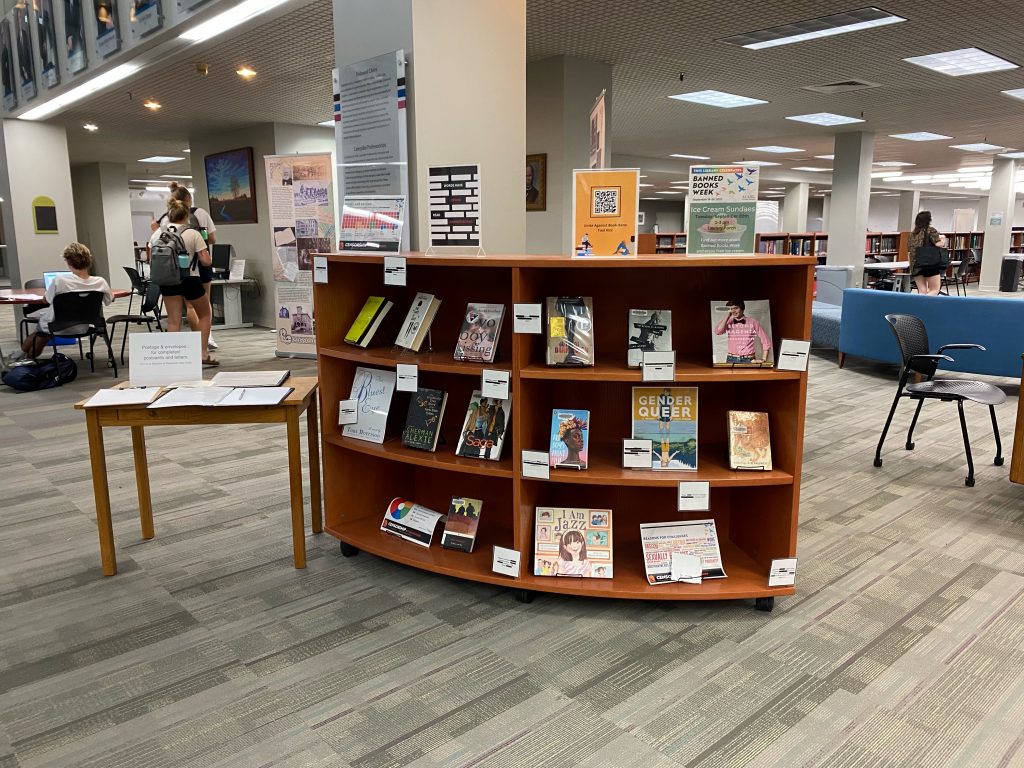As Banned Books Week takes place across America, Bradley’s Cullom-Davis Library is celebrating books that have been banned or challenged for their content from Sept. 18 through Sept. 24.
Organized by the American Library Association for libraries across the country, Banned Books Week is designed to honor the freedom to read and the power that words can have.
“We want people to be aware that book banning is something that still happens,” Christina Norton, online learning librarian, said. “I know people can often think of historical examples like Nazi book burnings and stuff like that. But it’s not a thing of the past; it still happens today.”
On the main floor of the library, there is a display set up of recently banned or challenged books. Along with each copy of the book, there is a sheet of laminated paper with a description of the book’s content. However, many words on the sheet are redacted to show why they have been banned.
Not only are the books on display, but visitors can also send letters in support to libraries who are being challenged across the country.
The library hosted events throughout the week to encourage student participation in the celebration, including a self-serve ice cream bar on Tuesday for students to get a treat and learn about the books.
“It’s just a fun thing to tie onto the banned books week just so we can offer them [students] something nice but also inform them on what’s going on,” Norton said.
Next to the ice cream bar, the library set up a postcard station along with a flyer of books banned this year and the reason why each book was removed from shelves. Inclusion of LGBTQ+ themes was the most common reason for the challenges.
On Wednesday at 6:30 p.m., a read-out was hosted in the Wyckoff Room of the library where students could listen to professors from the English and communications departments read a passage from a banned book of their choice.
To start off the event, Norton gave a presentation about the history of book banning and included examples of Galileo’s library and the Nazi book burning.
Along with the reading of a passage, each professor gave a speech on why the book was banned and why they believe that it shouldn’t have been.
“I believe that the underlying reason for these bannings is all the privileged actions that Holden takes along with the intensely privileged actions that he reveals he’s kind of that insider who’s showing what all the folks [white males] who are in the club get to get away with,” English professor Danielle Glassmeyer said about her banned book of choice, “The Catcher in the Rye.”
In Dr. Melinda McBee Orzulak’s speech, she urged students to use their voice and stand up for what is right when it came to controversial topics in banned books.
“It’s important to add your own voice to the conversation and to think about what the implications could be if certain topics aren’t addressed,” McBee Orzulak said. “…We need to have those conversations and not just shut the conversation down from the beginning.”
Other readers from the English faculty department included English department chair Lee Newton, associate chair and professor Seth Katz and professors Elena Gabor and Dakota Horn from the communications department. Norton also presented a reading of her own.
The majority of the books read were either banned because they presented the United States and its ethics in a negative light or they contained stories about the LGBTQ+ community.
“When we are looking at these books that have ideas that challenge people’s viewpoints, it’s a lot easier to just reject something that’s different…it’s a lot easier for people to just ban a book because it’s something difficult to think about,” Colton Wilder, counseling graduate student, said.
Although Banned Books Week comes to a close on Sept. 24, the books are available for students to check out throughout the year.





